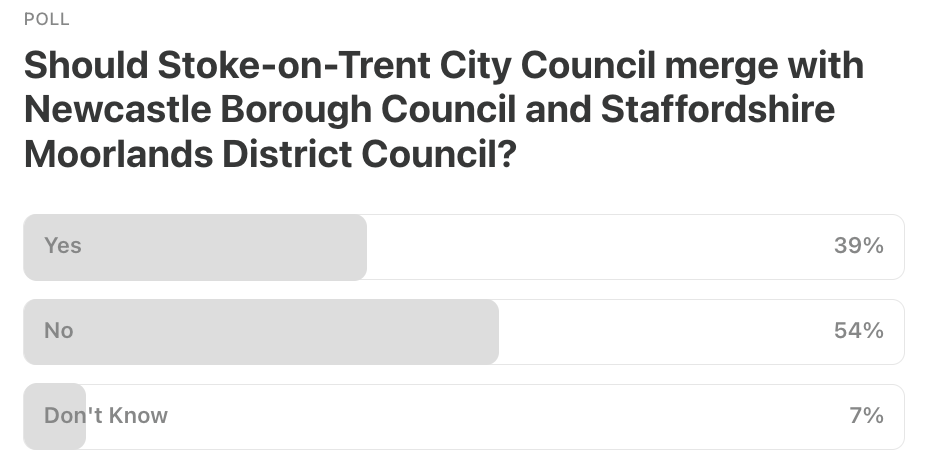Should We Become A Unitary Authority? We Get the For and Against from Two Prominent Local Politicians…
Proposals to merge Stoke, Newcastle and Staffordshire Moorlands into one unitary authority has invigorated some and infuriated others. We outline the pros and cons



Becoming a unitary authority is getting closer to a reality for North Staffordshire, with one option to merge Stoke-on-Trent City Council with Newcastle Borough and Staffordshire Moorlands. Labour councillors in the city, including the leader of Stoke-on-Trent City Council, Jane Ashworth, have largely backed the plan. She says, “Devolution through a Mayoral Strategic Authority means more control over our destiny, with strategic decisions made here rather than in Whitehall”.
The leader of Staffordshire Moorlands Council, Mike Gledhill, another Labour councillor, is also in favour of an enlarged North Staffordshire Council. The Moorlands’ proposal would see Staffordshire Moorlands, Newcastle-under-Lyme, Stoke-on-Trent, plus Stone and Uttoxeter become part of a new North Staffordshire Council. However, the leader of Newcastle Council, Simon Tagg, is one of its most outspoken critics, citing financial concerns and accountability as the major drawbacks.
But what do you Knotters think? Our recent poll evoked the memory of the 2016 referendum on the EU, where 52% voted to leave and 48% wanted to stay…
The case for: Allison Gardner, MP for Stoke-on-Trent South
Allison Gardner echoes Ashworth’s view that a unitary authority would bring decision-making closer to us, instead of allowing decisions to be made in Westminster. “I have heard a lot of people are worried that a unitary authority would mean that their area will lose its identity, but I would argue the contrary; it can only allow local identities to grow and flourish as the people making decisions will be from the local area.
As it stands, especially in Staffordshire and Stoke-on-Trent, the boundaries of local councils can be unclear to people. For my constituency of Stoke-on-Trent South, we have four councils to deal with, often leading to confusion about who constituents need to speak to.
“Stoke generates the wealth which often then moves to the surrounding rural areas, creating a donut economy”
A North Staffs unitary authority would streamline costs and bring more investment and control to the area. The fear that combining with Stoke would result in less money or services for the rural parts is mistaken. Stoke generates the wealth which often then moves to the surrounding rural areas, creating a donut economy. Local government reorganisation would support a more coherent economic plan.
I am a big advocate for parish councils and residents associations; their knowledge and passion for their local communities is admirable. With a unitary authority, their voices will be listened to with much greater power as the representatives of their local areas, and this crucial point was mentioned in an adjournment debate in July 2025.”
As Gardner points out, the next level for devolution is still to be determined, but she hopes that Stoke could look at more radical approaches that would fit North Staffs better culturally, socially, and economically. “A North Midlands combined authority is one such suggestion, linking three university cities and the advanced manufacturing growth corridor along the A50/500.”
The case against: Simon Tagg, leader of Newcastle Borough Council
Newcastle Borough’s most senior politician has made his feelings quite clear on the unitary authority and that he doesn’t think it would be the right step for Newcastle. “We are being carried towards central government’s artificially imposed deadline to submit proposals later this year, and many questions of the government’s plans remain, including how any authority being forcibly joined with Stoke-on-Trent will deal with the city council’s financial situation and performance issues,” he said in one of many recent press releases where he has voiced his disapproval of the plans.
“The biggest issue for the community is still that no-one has shown how this will actually improve services for residents in Newcastle-under-Lyme,” he told The Knot.
“We’ve twice invited a government minister to come and see how well the two-tier system is working here. We’re hopeful they would want to see how well it works, rather than forcing through unwanted, unwelcome change from an office in London.
“We’ve twice invited a Government minister to come and see how well the two-tier system is working here.”
“We agree with devolution of powers and funding through Strategic Authorities covering Staffordshire and Stoke-on-Trent to look at things like transport, infrastructure, and job creation, but many questions remain unanswered about forced council reorganisation locally, such as how anyone merging with Stoke-on-Trent isn’t affected by the city’s continuing debts and administrative issues.
“I’m not convinced this will go ahead because it’s taking up so much time and will cost so much money when there’s no public demand for it, but if change is forced upon us, then our preferred option remains a single authority on the current Newcastle boundaries.”
Tagg may not be sure if the plans for a unitary authority will ever come to fruition, but the government maintains that it’s committed to the plan – even in the wake of Reform’s runaway success at local councils this May – with full proposals for unitary authorities due by 28 November, 2025. Regardless of the outcome, changes won’t take effect overnight, with full implementation anticipated around 2028.
Want to read more about what a unitary authority might mean for Stoke? Check out Jenna’s piece here.








Excellent articles